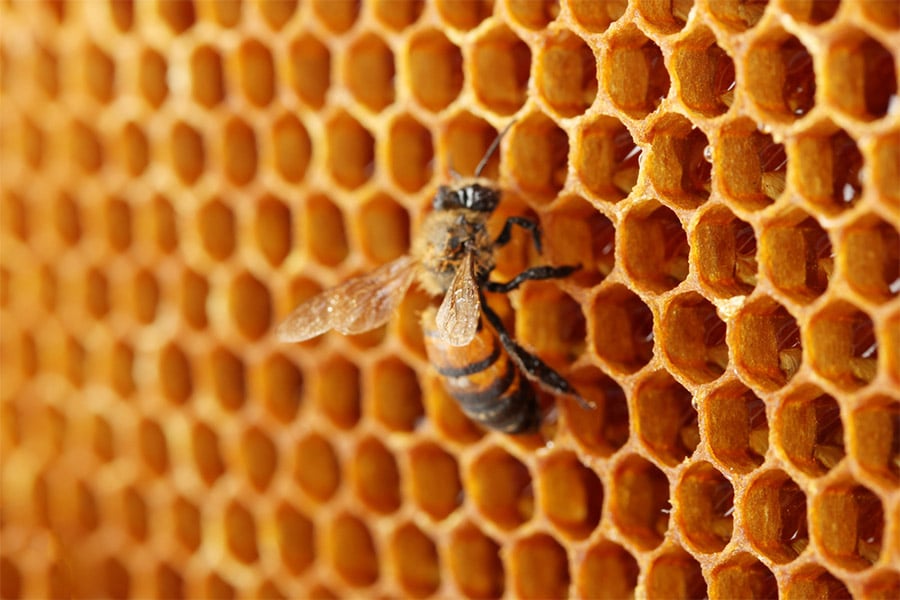
When honey bees made themselves at home, building colonies at The Ledges Golf Club and Chicopee Country Club, the South Hadley and Chicopee, Massachusetts communities welcomed them. International Golf Maintenance, which provides maintenance services for both golf courses, knew just how to keep them safe. Mike Bach, IGM’s superintendent at Chicopee Country Club, happens to be a professional beekeeper and was happy to take responsibility for the colonies.
A colony of bees consists of 20,000-60,000 honey bees and one queen. Bach keeps an eye on two colonies at The Ledges and 10 colonies at Chicopee, located near the maintenance buildings. “We keep them out of sight for their own protection.” The honey bees present no danger to golfers at the courses, unless they were to be disturbed, of course. “The maintenance crews are comfortable around them. We’ve never had a worker stung,” said Bach.
The annual nationwide survey by the Bee Informed Partnership found 37.7% of honeybee colonies died during the 2018-2019 winter months, nearly 9 percentage points higher than average. “Beekeeping is a lot of work, involving timely decisions. The biggest challenge here is the weather,” said Bach. “2018 was very wet and very hot, which challenged the bees to gather enough food for the long New England winter. With our help, they have a fighting chance. 2019 has been good for us, so far.”
Bees are extremely sensitive to pesticides, and both golfers and non-golfers have expressed concerns about pesticide usage on golf courses. With a long-standing commitment to healthy environments, IGM protects and fosters the bee colonies, partly to demonstrate how environmentally friendly their golf course maintenance operations and products are.
Bach also noted, “There’s a symbiotic relationship between humans and honey bees; we need them, and they need us. Feral bees are under a lot of environmental stress and are becoming extinct.”
The American Beekeeping Federation estimates that one-third of the food we eat in America depends on honey bee pollination in one way or another. Honey is also widely regarded for its use as medicine, for everything from sore throats and digestive disorders to skin problems and hay fever.
Some of the factors in the declining honey bee population, and Colony Collapse Disorder (CCD), according to the Environmental Protection Agency, are:
- Increased losses due to the invasive varroa mite, which has recently entered the U.S., as well as other emerging diseases.
- Pesticide poisoning through exposure to pesticides applied to crops or for in-hive insect or mite control.
- Stress the bees experience from such things as transporting hives to other locations for pollination services.
- Changes to the habitats where bees forage, which can lead to inadequate nutrition.
As a professional beekeeper with 100 colonies of his own, Bach is proud of the success IGM has achieved with maintaining the colonies at The Ledges and Chicopee. “People immediately want to say pesticides are the problem, but we are well educated in pollen protection. We’ve maintained these colonies on golf courses for several years.” IGM is extremely conscious of environmental issues at all its golf courses. The company uses an Integrated Pest Management System and is committed to providing high quality services that ensure a safe and healthy workplace for employees and minimize potential impact on the environment.
In addition to preserving the honey bees colonies, IGM harvests and packages the honey, using it in the kitchen and as a natural sweetener. Mike Fontaine, IGM’s manager at The Ledges, said collecting the honey is a nice way to show the fruits off our efforts.
IGM is a leader in comprehensive golf course maintenance services, with a company-wide commitment to environmental stewardship at all client courses. For more information on IGM and the professional golf course services offered, please contact Greg Plotner, Executive Vice President, 407-589-7200.

